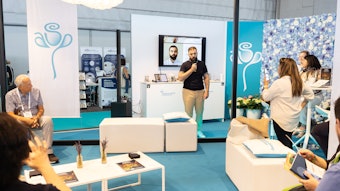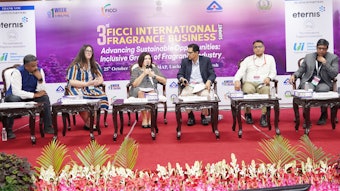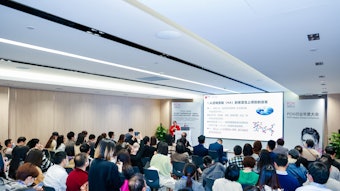
The class of 2013 from FIT Master's Degree Program for Cosmetics and Fragrance Marketing and Management presented their projections for the beauty industry in the digital world on Wednesday night at FIT, and offered insight on how the beauty world will change in the coming years.
The "Beauty in a Digital World" event, which predicted the emergence of facial recognition and predictive analytics technology among other technological advancements, started off with keynote speaker Joe Rospars, who is the CEO and founding partner of digital strategy agency Blue State Digital, and also worked with the Obama campaign for the 2008 and 2012 elections.
Rospars spoke of the importance of technology in the Obama campaign and the benefits that can be reaped from technology, social networking and working across different industries. The main points of Rospars’ speech were the importance of setting up for success, making products social by means of the relationships with consumers, and balancing the art and science of each individual industry.
The floor was then turned over to the class of 2013, who divided their projections by three major categories; digital analytics, digital marketing, and digital commerce.
Lead by group leader Emily Coleman, assistant VP at L'Oréal USA, the digital analytics segment was focused on better ways to gain consumer insights by the use of “Big Data." The digital analytics group projected that “Big Data” is the next big opportunity for industries and companies to be in touch with the needs and wants of their consumers. “Big Data” would allow for a faster and more accurate way to improve concept testing, new innovations, supply change, sampling, and the biology of consumers' individual needs. Through the usage and exploration of “big data,” brands and retailers would satisfy the greater majority of their customers through a highly customized approach. This more specific approach to analyzing the needs of consumers, called micro-targeting is the key to improving the beauty industry in the digital era.
The digital marketing segment, lead by Beiersdorf Inc.'s brand manager, Andrew Videira, focused on the concept of human centric-marketing and micro-targeting the key consumer market. Such concepts have been heard of before through like advertisements that are based upon what consumers have bought in the past, and also more futuristic ideas such as facial recognition which would match consumers to not only what they have bought in the past, but also link people to products that they might want in the future. The amount of smart technology that is being utilized around the world today plays a role in digital marketing and how companies approach their customers. Return on Learnings (ROL) will replace Return on Investments (ROI) as a new real-time metric to track and drive brand value. Sensors will be molded into product packaging to track actual consumer usage behavior.
The final key area the students discussed was digital commerce, which was lead by Procter & Gamble USA brand manager Katherine Voyten. The future of digital commerce is founded upon integrated the in-store and online shopping experience through technology. This idea of combining both the in-store and online experience is based on convenience, curation, and customization. By combining these two experiences, the customer feels as though their experience is more personalized to their individual needs and wants.
The presenters urged that in order for the industry to develop into the vision that the class of 2013 has projected, then the beauty industry needs to further embrace the technology that they have currently been employing.
Stay tuned for photos on our Facebook page and continue the conversation on LinkedIn.










